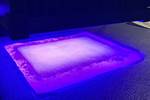Toray obtains ABS type approval for in-situ VARTM ship repairs
American Bureau of Shipping (ABS) certifies use of jointly developed CFRP repair technique on FPSO and FSO industrial systems, addressing traditional steel restoration challenges.
Toray Industries Inc. (Tokyo, Japan), announces that it has became the first in the world to obtain type approval from the American Bureau of Shipping
(ABS, Houston, Texas, U.S.) for its vacuum-assisted resin transfer molding (VARTM) process for in-situ ship repairs. This process entails Toray applying carbon fiber-reinforced plastic (CFRP) material to corroded areas often found on metal floating production, storage and offloading (FPSO) and floating storage and offloading (FSO) systems.
ABS is a leading classification society accounting for around half of FPSO
and FSO certifications. This approval enables VARTM to be applied to these certified vessels, reducing the time needed for engineering reviews and
verification for ship repairs.
FPSO and FSO maintenance is typically performed offshore and uses steel materials. However, welding — or hot work — halts oil and gas production. In 2020, Toray and shipbuilding company Modec Inc. (Tokyo) jointly developed a VARTM repair process for these applications (read “Modec, Toray … repair solution using CFRP patches”). It entails applying Toray’s Torayca carbon fiber woven fabric — offering high strength and elasticity — to the surfaces of existing steel structures. Then, the fabric is covered with a film, vacuum sealed and injected with epoxy resin that is cured, bonding the CFRP to the structure.
An advantage to this in-situ VARTM process is the ease in transporting the materials and equipment required to specific locations. It can also be used to perform repairs faster and with fewer people compared to steel-based techniques. Moreover, since the procedure does not involve hot work,
it minimizes the impact on oil and gas production.
Toray says it will continue to work on its in-situ VARTM process for a range of industrial applications while developing repair and reinforcement technologies for FPSOs and FSOs to promptly address market needs.
Related Content
-
TU Munich develops cuboidal conformable tanks using carbon fiber composites for increased hydrogen storage
Flat tank enabling standard platform for BEV and FCEV uses thermoplastic and thermoset composites, overwrapped skeleton design in pursuit of 25% more H2 storage.
-
3D-printed CFRP tools for serial production of composite landing flaps
GKN Aerospace Munich and CEAD develop printed tooling with short and continuous fiber that reduces cost and increases sustainability for composites production.
-
Pultrusion: The basics
A primer describing what pultrusion is, its advantages and disadvantages, and typical applications.


















